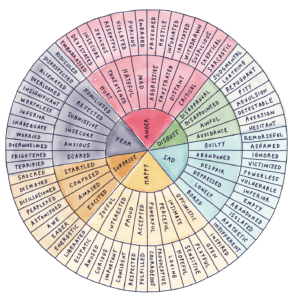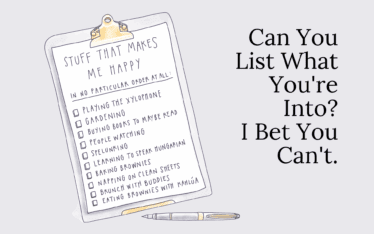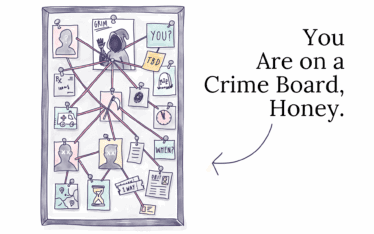How are you feeling right now?
Let me guess: “fine”? You can do better than that, friend.
Being able to accurately perceive your emotions (and also the feels of others) is an enormous component of emotional intelligence — something you might want to boost if you interact with humans in any part of your day, or if you want to get ahead at work. (The smart people at Harvard tell us that “emotional intelligence—the ability to, say, understand your effect on others and manage yourself accordingly—accounts for nearly 90 percent of what moves people up the ladder when IQ and technical skills are roughly similar.”)
Naming and taming your emotions
Are you familiar with mindsight? Psychologist Dr. Dan Siegel tells us that “mindsight is a kind of focused attention that allows us to see the internal workings of our own minds. It helps us get ourselves off of the autopilot of ingrained behaviors and habitual responses. It lets us ‘name and tame’ the emotions we are experiencing, rather than being overwhelmed by them.”
Like the tired-but-true management maxim that “you can’t manage what you can’t measure,” “you can’t heal what you can’t feel.” It’s tough to deal with our emotional states when we’re oblivious to what we’re really feeling deep down inside — especially if we’ve become accustomed to burying our feelings like a dog buries bones in the backyard.
To be clear, sometimes we don’t need to “deal” with our emotional states at all. Healing isn’t necessary if we’re feeling serene after a great massage and an hour of reading a novel with a cup of tea. Feeling bitter, jealous resentment towards a friend who just got pregnant for the third time when your IVF just failed for the third time, well that might need a wee bit of healing. Feeling isolated from working in your 605 sq-ft studio apartment for 24 months straight… that emotion might need some healing too. Awareness, as they say, is the precursor to change.
Getting granular with your emotional vocabulary
Researchers tell us that being able to name our feelings with detailed precision can help us regulate our emotions.
In one study that fascinates and horrifies me in equal measure, arachnophobic participants were repeatedly exposed to spiders (enormous, furry tarantulas, to boot), and randomly asked to do a bunch of things in-between the spider torture exposure sessions — like distracting themselves, reinterpreting the situation, and labeling their feelings. A week later, when these same poor souls were exposed to the spiders again, only the study participants who were asked to articulate how they felt when seeing (and touching!) Tony the Tarantula were the most emotionally regulated. Apparently the act of naming their feelings (e.g.: “I am terrified of this eight-legged behemoth; I might pee my pants”) helped normalize their fears, and tap into a mindfulness-like experience that boosted awareness and acceptance.
A recent client experienced the searing feelings of shame after sending a cutting email about a customer… to the customer. Her accidental “cc” left her feeling nauseous, looking for a decent place to set herself on fire. As a big Brené Brown fan, she thought she wasn’t allowed to feel ashamed; we both agreed that shame felt like a super-accurate emotion to own rent, and that self-immolation wasn’t a productive way to de-shame-ify herself. She got to work on remedying her misstep and her shame slowly dissipated.
Another client reported feeling “bummed” about his work situation. After further probing, the best he could come up with was feeling “really bummed.” Looking at the Wheel of Feels, he experienced a eureka-like moment: “I feel disrespected! That’s it!” By labeling his feeling with granularity, he began setting up a plan to regain the respect he felt he had lost. If we had let him simmer in feeling simply bummed, he’d likely not have taken action at all.
Researchers randomly tracked the emotional content of 74,487 Twitter users’ tweets, dissecting their words before and after the users clearly reported feeling a positive or negative emotion (I can’t decide what would be worse: petting tarantulas or looking at hundreds of thousands of insufferable tweets). “For a majority of individuals, emotional intensity decreased rapidly after their explicit expression in an ‘I feel’ statement. This was the case for positive and negative emotions, but the effect seemed to be strongest and most immediate for negative emotions.” Pouring one’s heart out online is apparently cathartic? Key takeaway: name how you feel, and the crappy emotions will being to evaporate faster than if you bottle them up inside you.
Check out the Wheel of Emotions
Using the wheel to expand your vocabulary of feelings, what word describes you at this very moment?
You might start with a basic emotion — like anger — and realize it’s more about being irritated than anything else.
You might be feeling multiple feelings, some of which might be seemingly contradictory to one another. It’s possible to feel powerful and frustrated simultaneously… energized and furious… embarrassed and bored… I think you get the point. The goal is to accurately name all of the emotions you’re feeling, either out loud in the mirror (really — try it), to a friend, in a journal, or in a tweet, I guess (sigh).
Notice your emotions over time. One of my clients tracked his feelings for a few months and realized his job was officially dragging him down (with the possibility of drowning him). He tricked himself into thinking his career blahs were innocuous and temporary. Seeing words like “infuriated” and “withdrawn” in his journal on a regular basis helped wake him up to the reality of his days. It wasn’t the kind of life he wanted to be living… so he made a change and now uses words like “eager” and fulfilled” to describe how he feels.
The wheel doesn’t capture all the emotions, so feel free to add words that help you articulate your experience of being alive. (I’m hoping you add in something like “vitally alive” instead of “dead inside” — but even if you do feel dead inside, if you articulate that you feel dead inside you’re less likely to feel dead inside. Maybe don’t tweet that, though.)








